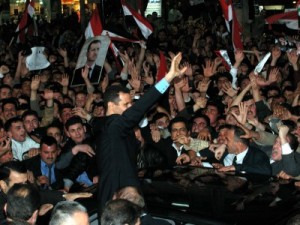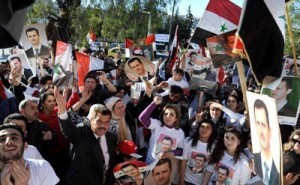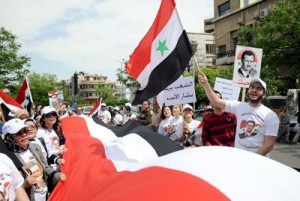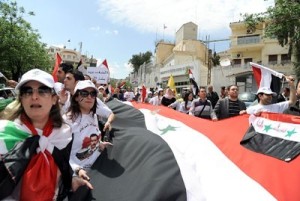On the indication of H.E. Professor Dr. Anton Caragea the electronic media, video agencies, printed publications and other mass media from 20 countries had offered excerpts from the inteview of H.E.Ambassador Extraordinary and Plenipotentiary of Kazakhstan to Romania-Mr. Daulet Batrashev.

Kazakhstan President H.E. Nursultan Nazarbayev-creator of free Kazakhstan of today and a true leader of Turkic world.
We have the pleasure of presenting to you the full text of the interview of H.E.Daulet Batrashev-Ambassador Extraordinary and Plenipotentiary of Kazakhstan.
KAZAKHSTAN: THE CENTRAL ASIAN LEOPARD.
THE BUILDING OF AN ECONOMIC GIANT.
Question: Your Excellency just started Your mandate in Romania, as the first ambassador of Kazakhstan to our country. What is the message of Your appointment and Your vision for the bilateral relation?
Answer: Romania-Kazakhstan bilateral relation is evolving rapidly and continuously in the right direction.
I will just emphasize that in 2012, Kazakhstan President took the decision to upgrade the status of the Diplomatic Mission of Kazakhstan to Romania to the Embassy and now, in 2014, I was appointed as the Ambassador of Kazakhstan to Your country.
This is a proof that on diplomatic level the trend is clearly ascending.
I will just add to this the fact that “KazMunayGas International” (former Rompetrol) investment is the largest foreign investment of Kazakhstan outside our borders and we have the plan to continue and develop our investment into Romania.
I will reiterate the fact that the Memorandum between the Romanian State and “KMG International” is creating a bilateral investment fund of up to one billion dollars that will dramatically increase and diversify the investments of Kazakhstan into Romanian economy, creating a solid base for our ever developing bilateral relations.
If we add to this, the reality that our political dialogue is based on a perfect understanding and our recent history is paved with moments that are marking our bilateral friendship such as: the Romanian support for Kazakhstan chairmanship at Organization for Security and Cooperation in Europe (OSCE), the high level presence of Romanian President and Prime Minister at the OSCE summit in Astana 2010 and we have a dynamic view of this relation.

Kazakhstan noted the enthused European support for His Excellency President Nursultan Nazarbayev’s initiative for creating a platform of security and cooperation in Europe and Asia say`s Ambassador Daulet Batrashev in dialogue with President-Professor Dr. Anton Caragea MA,FINS, EDA.
We in Kazakhstan noted the enthused support of Romania towards His Excellency President Nursultan Nazarbayev’s initiative for creating a platform of security and cooperation in Europe and Asia, based on the models of OSCE and Shanghai Organization, that could be beneficial to Romania, Kazakhstan and the world.
Concluding, I will underline the fact that Romania and Kazakhstan are starting their journey on the road for a strategic friendship based on our common political vision, economic interests and common foreign policy principles.
„Kazakhstan foreign policy strides for political dialogue, for creating a climate of understanding, dialogue-Ambassador Daulet Batrashev”
Question: What should Romanians know about today`s Kazakhstan. If Your long time history as the country on the Silk Road, of the state of Kazakh Khans of Turkestan is well known and documented, what is the image of today’s Kazakhstan?
Answer: Today Kazakhstan is a vibrant, modern and rapidly developing country.
President Nursultan Nazarbayev envisioned our country as „a Kazakh snow leopard, enriched with Western elegance, multiplied by our high level of development and wisdom and tenacity.”
I could not find a better description of our vision for Kazakhstan of tomorrow.
Kazakhstan of today envisages becoming the main economic hub between Europe and Asia, between the emerging markets of China and the developed Europe.

Kazakhstan hopes to become the main economic hub between Europe and Asia.
This new Silk Road of riches and commerce will stretch a total of 8,445km, with 2,233km in Russia, 2,787km in Kazakhstan, and 3,425km in China. This modern highway will pass through Aktobe, Kyzylorda, South-Kazakhstan, Zhambyl and Almaty regions of Kazakhstan.
This European-Chinese connector follows the same caravan routes as the Silk Road, the trade “highway” that ran from China to the Middle East and Europe, and saw its greatest use during the 14 centuries.
The new Silk Road will boost trade, commerce and will better and faster connect the land masses of Europe and Asia and will become not only a viable economic initiative, but will also generate work places, will help people rip benefits and have a better standard of life and by this we will enjoy in our regions political stability and prosperity.
This new Silk Road’s significance is far from just being a bridge of trade and exchange of goods, but will create a better understanding and dialogue causeway between the peoples of Europe and Asia.
I want also to draw Your readers attention towards a new concept launched by Kazakhstan under the name of «Silk Wind» project, by launching container train “China – Kazakhstan – Caspian Sea – Caucasus – Turkey – Europe.
According to the concept craved out by Kazakhstan, we envisage that cargo containers from China by railroad will be delivered to the Kazakh port of Aktau on the Caspian Sea. Then they will be loaded on cargo sea ferry and from here they will go to the Azerbaijani port – to Baku, and then again by railroad to Georgian ports where the fright goods will be delivered to the ports of Europe.
This economic concept build by our country within the framework of the diversification of transport and transit routes, was discussed at the conference “TransEurasia 2014″, during the past VII Astana Economic Forum in May 2014, when we have started building an international investors consensus in bringing to light this “Silk Wind” transnational project.
This commercial and economic initiative was completed in the political arena by President Nazarbayev’s appeal for a better dialogue and a common dialogue between Europe and Asia known as the Conference on Interaction and Confidence-Building Measures in Europe and Asia.
This is clearly marking the fact that Kazakhstan foreign policy strives not only for economic development and facilitating creation of trading corridors between Europe and Asia, but also strives for political dialogue, for creating a climate of understanding, dialogue, avoiding tensions and conflicts and creating a platform for dialogue between the countries of Asia and Europe.
Our country’s initiative is based on our successful Chairmanship of Organization for Security and Cooperation in Europe for 2010 and on our prominent track records as members of the Shanghai Cooperation Organization and the Eurasian Economic Union.
We are proposing our experience in dialogue and fostering international organization in the service of world peace and development, and we hope that the world is noting this Kazakhstan’s effort.
I would like also to observe our efforts in promoting religious dialogue and better understanding. Necessary to note our successful two year presidency of Organization of Islamic Cooperation, in difficult times, when we helped the Islamic world to concentrate on culture, education and Islamic heritage as unifying factors, as bricks of a better understanding of Islam in the world.

President Nazarbayev brought together representatives of religious denomination from all continents and all corners of the world, in an open and long standing dialogue.
„Convened at the initiative of President Nursultan Nazarbayev, the Astana Religious Conference – CONGRESS OF LEADERS OF WORLD AND TRADITIONAL RELIGIONS – has become the most impressive and efficient world conference that established inter-religious dialogue”-Ambassador Daulet Batrashev.
But Kazakhstan was not only satisfied to preserve its religious legacy but was actively involved in the research for an open and continuing dialogue of religions and traditional religious leaders. At the initiative of President Nursultan Nazarbayev the Astana Religious Conference – CONGRESS OF LEADERS OF WORLD AND TRADITIONAL RELIGIONS – has become with the support and presence of all world religious leaders, the most impressive and efficient world conference that established rules and points for inter-religious dialogue.
President Nazarbayev brought together representatives of religious denomination from all continents and all corners of the world, in an open and long standing dialogue.
The fact that this series of meetings continues to be held continuously from 2003 is self expressing.
Our basic ideas where to use this rostrum is to make a statement of peace, concord and tolerance as stable principles of human existence, to obtain the achievement of mutual respect and tolerance between religions, confessions, nations etc and to oppose to the use of religious believes of people for fostering conflicts.
I hope that our ideals develop further and CONGRESS OF LEADERS OF WORLD AND TRADITIONAL RELIGIONS continues to be a solid landmark in the world of religions.
Question: It is incredible this excurse in what is the role of today`s Kazakhstan in the world, from economy, to foreign policy, culture and dialogue. Your country is continuing leaving a long lasting imprint on the world of today. What are the future plans of Kazakhstan, the heart of Central Asia, for the years to come and Your personal plans for developing Romania-Kazakhstan friendship?
Answer: The future will be undoubtedly bright as we hope to continue all this initiatives destined to develop for Kazakhstan a network of friendship in the world and to enable us to play our role as a force of moderation, democracy and development in the world.
Our main goal is to lead by example. I will recollect, for the benefit of Your readers, the fact that Kazakhstan was the first country in the world to voluntarily relinquish our atomic arsenal, left after the dissolution of Soviet Union, according the Decree from 1991 of H.E. President Nursultan Nazarbayev.
We have, by our own accord, accepted the dismantling of nuclear warheads, the evacuation of material that could be used for nuclear armament and we have stopped nuclear experience in the Semipalatinsk nuclear test site.
These are valuable contributions of Kazakhstan to a secure and safer world, a world without nuclear weapons and in 2012 at Seoul Summit we have offered to share our experience to help other nations to embrace the concept of a nuclear weapons free world.
We offer to host a low enriched uranium bank in Kazakhstan under the auspices of the IAEA that will help tackling the issues of nuclear material trafficking and will guarantee the use of nuclear materials for peaceful purpose.
This is another proof of the way that Kazakhstan aims to take action on global stage: leading by force of example.
In our bilateral relations my agenda is rich and amongst my priorities I can enumerate for Your reader’s information the desire to foster our political dialogue, to develop the economical presence of Kazakhstan in Romanian economy on the template of the success that is Rompetrol experience.
“KMG International” is today one of the biggest contributor to Romanian budget with more than 1 billion euro`s annually, offering to Romanian people the possibility for a better life, if we add to this the number of jobs created in Romanian industry and connected jobs, we have a number of around 100.000 jobs offered for Romanian people. I believe that these figures are self-speaking for the beneficial influence that a Kazakh investment is having for the Romanian state.

Kazakhstan it is a wonderful place to visit and to emerge in it.
“We hope that Romanian products find their way to Kazakhstan market”-Ambassador Daulet Batrashev
We can imagine how this relation will be developed, when we start our next investments in Romanian economy, we are already the second foreign investor in Romanian economy and at the end of this investment process we can become the first investor in Your economy.
We are determined also to help Romania balance the bilateral trade with Kazakhstan and we hope that Romanian products find their way to Kazakhstan market. World renowned Romanian products like Romanian wine, agricultural products, high quality industrial products, furniture that is having a long tradition of presence on our market are just a few of the Romanian manufactured products that we will be happy to see on our internal market. Plus I tell the future business partners of Kazakhstan not to forget that our country is the center of a free-tax zone in all Eurasia through the Customs Union so their products find their way not solely to Kazakhstan, but to Russia and Belarus as well.
We are speaking often about the fact that Romania must become the hub for Kazakh products to be spread across Europe and this is equally true for Romanian goods and services that can take advantage of our relaxed laws and regulation and tax free zones and make Kazakhstan the bridge head in conquering, with their products, all of Asia.
It is a daring thought but a realistic one.
I would like to conclude by saying to the Romanian people that You will always have in Kazakhstan a firm and proven friend, and all that we have built in our bilateral relation from economic cooperation, to foreign policy and to diplomacy, must be complemented by people to people interaction.
Kazakhstan is much more than just a normal developed country, it is also a country of wonderful people, of breathtaking scenery and scenic spots, it is a wonderful place to visit and to emerge in it.
Kazakhstan is waiting for You with open arms.










 Syria’s Ambassador to the UN in Geneva Dr. Fayssal al-Hamwi
Syria’s Ambassador to the UN in Geneva Dr. Fayssal al-Hamwi

